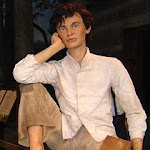
Do you ever have one of those happy-sad kinds of days? Happy you’ve completed something, but sad that it’s come to an end. Yesterday was that kind of day for me. I’d spent more than month with Abraham Lincoln and Harold Holzer. They’d been with me as I studied for my Lincoln course final exam, over lunch and late at night, on the plane as I went to and from California, and on the freeway while I was there.
It took me longer than the average reader to get through Holzer’s
Lincoln President-Elect: Abraham Lincoln and the Great Secession Winter 1860-1861. As a student of Lincoln, I can’t just “read” a book – I have to study it. If a quote or a reference catches my interest, my curiosity isn’t satisfied until I’ve turned to the back to read the notes and to find out where I can learn more. Thank goodness for a liberal renewal policy on interlibrary loan, which allowed me to take the time I needed to savor the book to the depth I desired.
Lincoln buff and Holzer’s too
I’ve been a Lincoln fan since childhood, but my first encounter with Holzer’s work was when I reviewed
The Lincoln Mailbag for the State Journal-Register in 1998. I was an instant fan of his as well. Holzer has now written or edited more than 30 books on Lincoln, and each one keeps readers coming back for more.
Lincoln President-Elect covers the 16th president’s activities from election through inauguration, not just for two-and-a-half months like today, but four months. Lincoln’s inauguration was held on March 4.
The timing for this book is appropriate, as Americans are watching the activities surrounding Barack Obama’s president-elect days. We see similarities between the two – and other U.S. presidents – in selecting a cabinet, preparing to uproot a family, preparing an inaugural speech.
A unique perspective
But in Holzer’s work, we also see the effect of the secession crisis on the president, the impact of the press, the role of his colleagues, political friends and enemies, and more. Holzer takes us along with Lincoln through the streets of Springfield, for a final visit to his aging stepmother and as he deals with favor-seekers by the hundreds. We’re with him when he treks tiredly home after a long night waiting for election results and on the train as he gives speeches along the rail route from Illinois to the nation’s capital. We see Lincoln through the eyes of his closest colleagues and strongest political foes, as Holzer seems to leave no crucial recollection untouched.
Holzer has written solo, edited the works of others and often collaborated with other authors, both well-known and obscure. This book was Holzer’s alone and his intuitive, colorful voice came through beautifully, yet I couldn’t help but note his work was richly enhanced by the contributions of a writer from Lincoln’s time.
Henry Villard was a New York Herald reporter who was essentially embedded with Lincoln on this particular journey through time. Time and again Villard provides a unique perspective into Lincoln’s thoughts and activities. Holzer seems to have skimmed the richest cream from Villard’s vessel – and it’s made the book all the more delightful.
I think that’s one of the strengths of this co-chair of the U.S. Abraham Lincoln Bicentennial Commission and why his books are so successful. Harold Holzer seems to know when he should tell the story and when he can allow those who were there to do it. In Lincoln President-Elect, he struck the perfect balance.
More Holzer to comeAs for the happy-sad feeling – I won’t have to suffer it for long. I still haven’t read a lot of
Holzer’s earlier books, and he has three more new ones on the horizon:
I’m looking forward to having Holzer and Lincoln with me again, just as soon as I get done with Eric Foner’s Our Lincoln: New Perspectives on Lincoln and His World, Fred Kaplan’s Lincoln: The Biography of a Writer and the book, Liability Claims Practices, by my fellow former Toastmaster, James R. Jones, which I must read for an industry course. Fortunately, Jim, now director of the Katie School of Insurance and Financial Services at Illinois State University, can actually make a book about insurance interesting – not quite as interesting as Lincoln, but that’s a hard act to follow.








